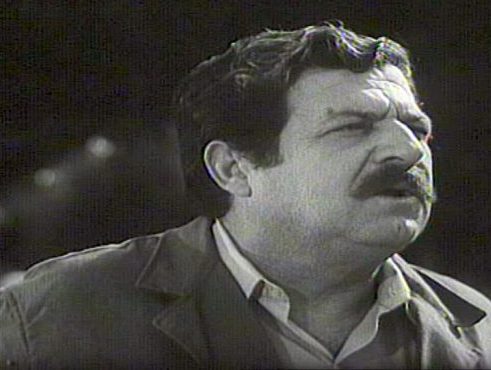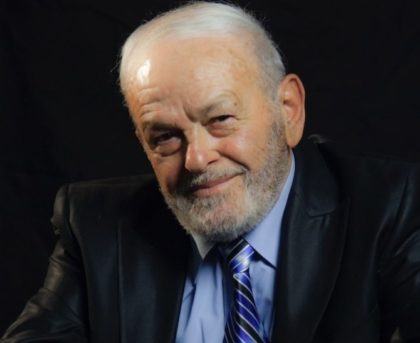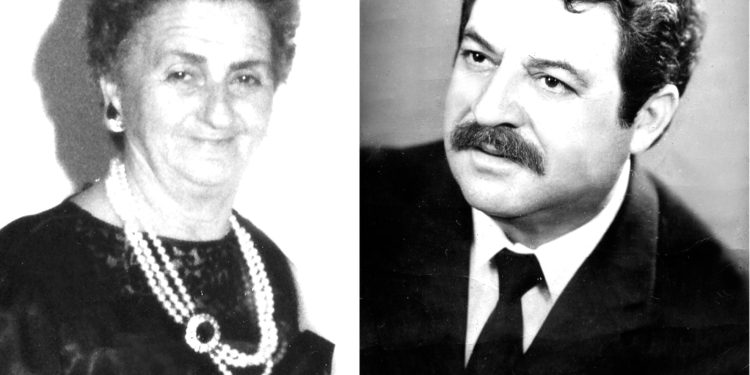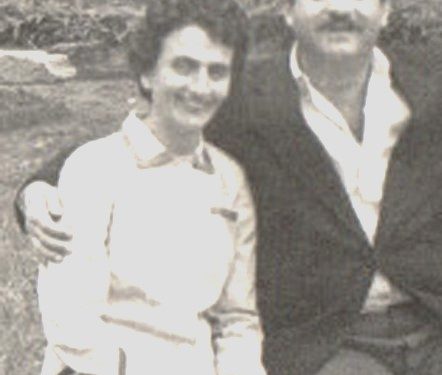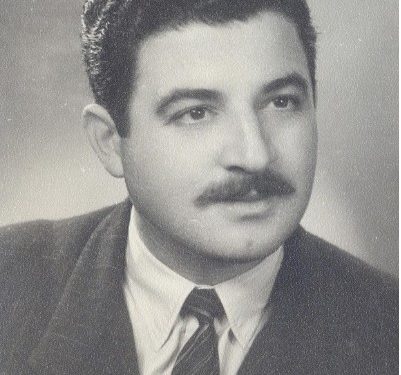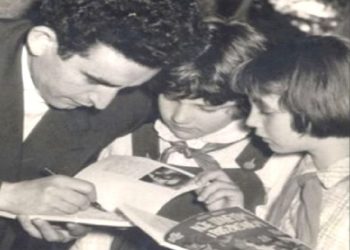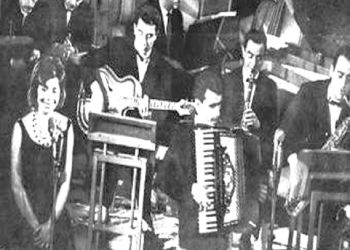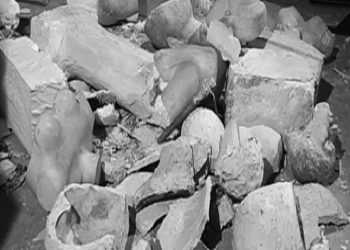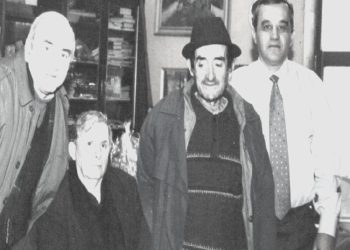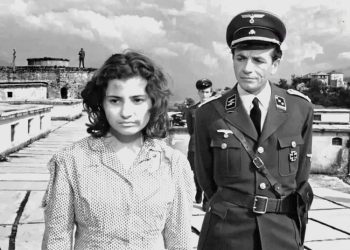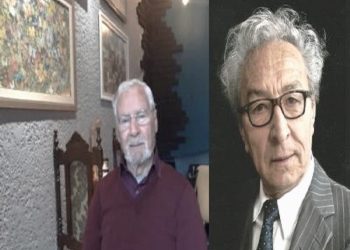By Miho Gjini
– NIKOLIN XHOJA, A TRAGIC LOVE STORY –
Memorie.al / Everyone has a story, they mark it. A true story. And the truth is even more beautiful, no matter how sad it is said. The truth is simple. And this genius artist was like that: simple, true, beautiful…with a tragic life story. History itself is a myth, or to put it more elegantly, myth reproduces within its own matter, one of the most unique and most surprising stories. One of these stories that borders on myth in terms of surprise, uniqueness, rarity and tragedy is that of Nikolin Xhoja’s parents, which would begin in the Italian city of Brindisi, in 1920. There, an Albanian girl of Vlach origin named Parashqevi Bushi would set foot, along with several other immigrants from Durrës.
Coincidence, and perhaps her physical beauty, would lead her to meet the owner of several cinemas in this city, Teodor Gioia, who would also become her husband, without a wedding, and give birth to their first child, as in the stories of movies. The child would be named Ugo and he would also have his own sad story, of growing up in a Charity institution, due to the very circumstances created at that time. Two years later, on May 12, 1926, her second son, Nikolin, would be born, a happy, beautiful and healthy child.
Afraid of losing this son too, Parashqevia abandoned her husband, secretly fled by ferry from Brindisi, together with her second baby, to once again begin the ordeal of a painful life, somewhat more difficult than that of her ancestors, who carried their lives on mules’ saddles, from one place to another, on land and under the open sky…!
All alone, she settled in a nook on the Sefer Efendi hill in Durrës and began working as a washerwoman, to earn a living for herself and her child, who was growing up in this extreme poverty. And always, as in movie scripts, a noble benefactor will appear, such as the employee of the English legation, Profiri Gllatkin, who would soften this rough life, of the young and lonely woman.
But night turns into day and day turns into night and things repeat themselves. The harsh poverty and uncertainty of life, forces them to settle Nikolini in the “Orphan Shelter” of Tirana, where the boy would grow up like that tree sapling, replanted near the pebbles of a river…! As soon as he was done for school, he returns to his mother in Durrës. With school lessons, with street friends and with some work he did as a courier at the City Bank, under the majestic and graceful statue of Queen Teuta.
However, another man would come from Mati, who would be proclaimed “King of the Albanians”, who opened the “doors” to the Italians as well. Soon their soldiers arrived, with steamers, tanks and planes. A painful duality was now developing in Nikolini’s soul: His father had Italian nationality and was no longer alive! However, the Bank was sometimes closed and sometimes opened.
Difficult times had come…!
Somewhere nearby, the machine gun shots of Mujo Ulqinaku were heard, and a spontaneous resistance was felt throughout the country. Meanwhile, King Zog, with his suite, was fleeing towards the South. What was happening?! Nikolini was still confused that day, when the courier started delivering the letters with the new announcements and another young man knocked on the door of the Bank, dressed in the uniform of the Italian army, who had the same face, the same black hair with wavy waves. And who said he was looking for Nikolin Xhoja! The employees thought it was a dangerous joke, because Nikolini was looking for Nikolini!
The surprise of the people left speechless, would be explained by the Italian soldier himself, that it was not Nikolini, but his brother, Ugo Xhoja! He also mentioned their mother, that he definitely wanted to meet them both, but that time did not wait for a second, so that his “head would not fly off” if he did not join the military column, which was marching towards Gramsh. Two hours later, mother and son, they would also set off towards Gramsh, in random cars, through the chaos, the screams and the fear. Italy had declared war on Greece and the Albanian territory had become a “battlefield”.
The fates of the war were mixed with the fates of the people! And the mother would find her son, Ugo, killed. And the brother would no longer be able to hug his older brother, pierced by bullets…! Whose? Who killed Ugo?! It was Friday. And their mother, they called her Premte, – (Parashqevi, in Greek), from where the Vlachs had descended on their pilgrimages, to come here, half alive and half dead!…
The whole country turned into a “battlefield” and the 19-year-old boy had to choose his “path” of life. And he chose it, throwing his rifle to his side and going out into the mountains, along with the illusion that these “turbulent times” would be separated from communism, which initially had some Christian ideas and messages, about brotherhood and human love! It is about the inner “fire” of a young man, when the “storm” of the partisan war swept him away.
None of the partisans believed that they would have in their ranks a boy of Italian origin, who was so willing to fight against his compatriots, who landed in Durrës. But he would tell them that he felt himself a “true Albanian” and that it was against this war that “took” his brother, like “cannon fodder”, in the Italo-Greek war.
However, the partisans could not help but be surprised by this man who, along with his rifle, had also taken his guitar with him. Singing was his early passion, as a child, but also his genius (I would say), from his father who projected all the films of the cultured world in his cinemas in Brindisi. Accompanied by the feeling of acting, at the mountain he played Besim Levonja’s sketch for the prefect of Tirana – a role that he would fully interpret even after the liberation of the country, (after the sensational success that Mihal Popi and, a few years later, Robert Ndrenika also had with this role), to join them in liberated Durrës, in a joint performance, when he was “kidnapped” by the theater of this city, under the name of Aleksandër Moisiu.
The talent of this actor (without schooling), would be fully revealed in this professional theater and he would be the most famous actor, with a wide range, in comedy, variety, drama and operetta, as well as in film. I would marvel at the role of Podgolisin from Gogol’s comedy ‘Marriage’ and this would be one of my first writings as a Theatre Critic, continuing with the humorous and very credible interpretation that he already gave to Qazim Mulleti of Levonja.
After that, he would play in several theatre pieces from the Russian dramaturgy of that time and would be very original in 25 works of the national repertoire, to shine in the dramatization of a novel by Dritëro Agolli, with the role of Commander Rrapo, with the same brilliance that he had in the comedy “Korça Carnival”, with a proverbial character, like Nikollaq Jorganxhiu, although the masterpiece of his interpretations would remain Gogol’s Gorodnič.
Even the masterful roles from classical comedy, with Shakespeare, Moliere, Goldoni, etc., where his humor was more than pleasant and natural, would not fall below. His success would be immediate on the Estrada stage, where he was applauded several times even in sketches, as well as in the operettas that were performed in Durrës, with works by Dunajevski, Dungu and Mara, in which he was brilliant both as a singer and an instrumentalist. Without leaving aside his hilarious films, especially with the charming character of Uncle Beqo, so natural, with the organicity of a superior degree.
Nikolin Xhpoja, was and remained an irreplaceable artistic personality. He brought something of his own to the stage, both from the heritage of the Italian art of “Commedia dell’Arte”, as well as from the Italian “neo realism” of street interpretation, just like himself, with full of improvisations and natural surprises, like no other. With a variety and breadth of interpretation. Always unfazed and vital. With a scenic freedom and extraordinary sense of improvisation, without ever fixing the roles and, always feeling the process of creation as in the premiere.
An actor with a great human spirit, beloved and indispensable, a classic, special example, for the Albanian Theater and especially for the new generation of actors who start the “path of acting” and their professional education, with great desire and then end up as theater extras or as waiters, dishwashers or gasoline sellers, outside their country…!
Once upon a time, the “People’s Artist” Nikolin Xhoja was a wonderful comedian on stage and screen, as well as tragic in life. “God had created Nikolin Xhoja for the theater, with a charming appearance,” my classmate and partner in the same theater told me. “He was handsome in life, handsome on stage, and pleasant in society. But when he stepped on the threshold of the theater, he became serious, reserved, and attentive.”
The Party and Government of that time brought these talented people closer, gave them their Party membership card, as well as high titles, but if you “slipped your foot” and stepped out of the “red line of their yard,” they would also make a “hole” for you, as would happen to the communist Nikolin. They immediately demoted him for his son Ugo, with whom he revived the name of his brother killed in the war, who they accused of “a word of mouth”, of “Agitation and Propaganda” and locked him in prison.
Nikolini and his wife Meropi, – also an actress, spent the darkest days of their lives. What had their son done? They were surprised, how an uneducated and ignorant coachman was placed at the head of the Party in Durrës! And after this “act” they expelled him from the party and forbade him from going on stage. The great actor fell ill and was hospitalized, with the diagnosis; “cerrosi epatica”, with his liver destroyed by the excessive alcohol he drank, to console himself in that tragic solitude, when everyone turned their backs on him, did not accept him into the theater, not even dead in a coffin, to pay the occasional homage to this giant artist, who no longer comes to Albania!
Concluding this tragic and sad story with the taking of the house after his death, taking out the family he left behind, the children, the poor furniture and the texts of his immortal roles, which the wind of the troubled sea carried away…! These days I walk along the cobblestones of my village street, where my friend Xhoja filmed the famous role of Uncle Beqo in the film “Kapedani”, with partner Albert Verri, my acting classmate, and I am carried away by sad memories of the art, simplicity and unique humor of this man, who also stayed at my house, with the entire filming team.
And, – believe me, – I feel blessed that I wrote a monographic book about him, without anyone helping me, neither for that year of work (with countless walks and necks Athens-Durres!) nor with the two promotions in Durres and Athens, surrounded by the indifference of officials, the Theater itself, and even his relatives, who had let the great artist’s grave, which should have been an honored place of pilgrimage for everyone, be covered in thorns. When, even in this promotion that took place within the Theater, in the “Odeon” with the artist’s name, it was not considered reasonable for the theater troupe to participate, how could the “fear” continue with this personality of Albanian Art (!?).
Likewise, as had happened to me, to my bad luck, for the six books that I had written and published, for the Colossi of Albanian Acting: Mihal Popin, Naim Frashëri, Margarita Xhepa, as well as the creative portraits for Kadri Roshi, Sandër Prosi, Kujtim Spahivogli, Besim Levonjë, Mihal Stefë, Tano Banush, Bexhet Nelku, Robert Ndrenikë, Yllka Mujo and for 15 other artists who left their mark on the stage and in our cinematography, to leave peacefully, I too, to the “eternal home” and to meet most of them there.
Then it is sad to think that the interested institutions, theaters, or even the relatives of these personalities, do not seek to promote and purchase these books, to have them in their archives and libraries. Even in the promotion held at the Academy of Arts, with the interest of Professor Milto Kutali and Rector Kastriot Çaushi, most of the acting students preferred to spend their time in the School’s Cafe…!
Medet! It is only preferable to donate them, the study books on acting, to have them on their shelves and bags, than to listen to what their professors said about these publications, without thinking that this is achieved with great creative work, countless sacrifices and efforts in time, never paid. Yesterday’s principle of “volunteerism” everywhere has remained like those “postage stamps” with the figure of the former Leader. While the most important figures of the Nation, its culture and conscience are appreciated and immortalized.
The eternally unforgettable…! As was the case for all of us, so was the Albanian-Italian NIKOLIN XHOJA. This one too…! Ministers, deputies, prime ministers and presidents can be forgotten, but not these, whose names are written on the “ALTAR OF TIME”…! Memorie.al




